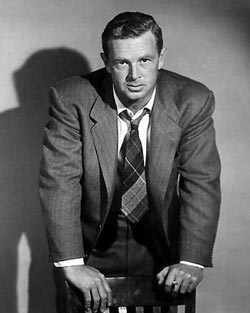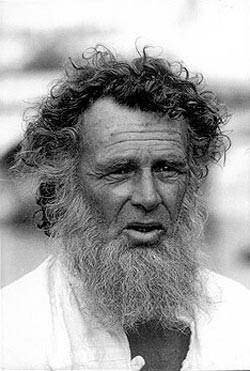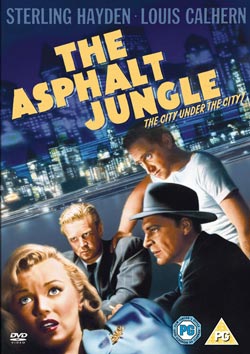
And then you have Sterling Hayden. In some ways he might be the hardest to pin down. What makes Hayden fascinating is that, as an actor, he really only makes sense within the context of film noir. He made many different kinds of films, but noir is his métier. His voice, a kind of rapid-fire bellow, is made for the clipped dialogue of a suspicious cop or a surly thug. His shopworn good looks and imposing physical presence make him a natural to play men stalking darkened city streets at three in the morning. What he lacks in nuance, he makes up for in essence. In crime films, he’s as natural as cheap carpet and cigarette smoke. No, he couldn’t act, he could only be. And that being was the key to why he was a great actor. Among noir heroes, he may well be the most intrinsically existential.
The man himself was always hard to pin down as well. Born Sterling Relyea Walter in Montclair, New Jersey, he lost his father at an early age and took his stepfather’s last name in his youth. About the same time he changed his name, he met the love of his life: the sea. He ran away to a life on boats, spending seven years working his way up to becoming and serving as a ship’s captain. During World War II he served in Yugoslavia and, almost by accident, found himself in the movie business.

Matters became worse when the House on Un-American Activities Committee came to town. Hayden had always leaned hard to the left—having been impressed with the Tito partisans he served with in Yugoslavia he became, for a time, a Communist—and when the witchhunters cornered him, he turned rat and named names. The incident was the low point of his life. “It’s the only thing in my life,” he said later “that I’m genuinely ashamed of. It still haunts me. Because I was a rat. I was weak. I have no excuse.”
Haunted by what he had done and the friends he’d betrayed, fed up with the subpar movies he was making (cast in westerns, he “couldn’t ride worth a goddamn” and was “the slowest draw west of the Rhine”), flat broke and waging a custody battle with his ex-wife, Hayden escaped into the arms of his first love. In defiance of a court order, he loaded up his four children on a schooner called Wanderer and set sail for the South Seas.
This period of his life was covered in his autobiography Wanderer, which might well be the best memoir ever written by a Hollywood actor. Steeped in the literature of Conrad and London, Marx and Whitman, Hayden set out to write a real book, not a trashy showbiz tell-all. He succeeded impressively at articulating the restless spirit that defined him:
Voyaging belongs to seamen, and to the wanderers of the world who cannot, or will not, fit in. If you are contemplating a voyage and you have the means, abandon the venture until your fortunes change . . . [W]e fling our lives beneath the wheels of routine—and before we know it our lives are gone. What does a man need, really need? A few pounds of food each day, heat and shelter, six feet to lie down in—and some form of working activity that will yield a sense of accomplishment. That’s all, in the material sense, and we know it. But we are brainwashed by our economic system until we end up in a tomb beneath a pyramid of time payments, mortgages, preposterous gadgetry, playthings that divert our attention for the sheer idiocy of the charade. The years thunder by, the dreams of youth grow dim where they lie caked in dust on the shelves of patience. Before we know it, the tomb is sealed. Where, then, lies the answer? In choice. Which shall it be: bankruptcy of purse or bankruptcy of life?
Hadyen was a character, no doubt. His legacy is found in his books and in his movies, a testament to a fascinating man and an indispensable artist.
Essential Hayden Noir:
T
Directed by John Huston, this is the heist movie by which all others are judged. (See my list of the top 5 classic heist movies.) Hayden plays a homesick hick living in the big city and making his way as a career criminal. He gets roped into a jewelry heist by a brilliant mastermind played by Sam Jaffe. Features a pitch-perfect supporting cast including Marilyn Monroe in her first big role. A masterpiece on all levels and one of the crown jewels of film noir.
Crime Wave (1954)
Directed by Andre De Toth, this was the second masterpiece headlined by Hayden. Here he plays a relentless cop tracking three murderous punks. He thinks they’re in cahoots with an ex-con played by Gene Nelson. Nelson is an innocent man just trying to go straight, but hard driving Hayden believes “once a crook, always a crook.” Gorgeous cinematography by Bert Glennon, and Hayden’s freight train performance make this a classic.
The Killing (1956)
The third masterpiece starring Hayden was director Stanley Kubrick’s breakout film. Hayden plays the mastermind of racetrack heist. He plans everything perfectly, but in true noir fashion it all goes to hell. The impeccable supporting cast includes Marie Windsor and Elisha Cook, Jr. as perhaps the most dysfunctional married couple in all of noir. With a script by Jim Thompson (who got stiffed on his writing credit by Kubrick), this film is crime flick gold. Hayden’s best performance.
Other notable Hayden flicks:
- Manhandled—His first noir. An uneven film, but it has its moments.
- Naked Alibi—A crime flick with Hayden and Gloria Grahame. Not a great movie, but did I mention it was a crime flick with Sterling Hayden and Gloria Grahame?
- Johnny Guitar—Western Noir. Joan Crawford and Mercedes McCambridge square off with Hayden in the middle.
- Dr. Strangelove—In Kubrick’s black comedy, Hayden obviously has a good time playing a rightwing nutjob obsessed with the Communist plot to “steal our precious bodily fluids.”
- The Godfather—Another crime masterpiece. Hayden is the crooked cop who learns that having pasta with Michael Corleone is a bad idea.
- The Long Goodbye—In Robert Altman’s revisionist take on Philip Marlowe, Hayden serves as a pivotal link back to classic noir.
Jake Hinkson, The Night Editor, is the author of Hell on Church Street.

Marvelous post, Jake. Thanks. Makes me want to re-visit this misunderstood actor.
I also quite liked Crime of Passion with him.
Love the quote from the memoir. Passing it around cubical-ville today, depressing the hell out of everyone. Scotch, anyone?
P.O.E.! I think you’re giving short shrift to his turn as the monomaniacal Ripper in Strangelove. Although his noir is exquisite and Kubrick the Prick stiffed him on the writing credits before, that role will always shine.
Hayden was also the first choice to play Quint in “Jaws,” but, as I recall, tax problems prohibited his being hired.
Robert Shaw did a great job as Quint but I believe that Hayden would have done a great job too, probably even better than Shaw.
It’s a shame that he didn’t land the part.
A favorite of mine, too. He could play barely contained rage in a way that made your hair stand on end.
Excellent appreciation. Sterling Hayden was perhaps the most complex and accomplished individual ever to acheive movie stardom, a distinction which he treated with disdain and only as a means by which he could buy, live aboard and voyage on large sailing vessels. He commanded transoceanic voyages while still in his early twenties. His war service as a Marine and OSS officer in the Balkans, for which he won a Silver Star, would alone be acheivement enough for most people. His writing is vivid and original. Yet he was tormented by guilt and plagued by alcoholism to the end of his life.